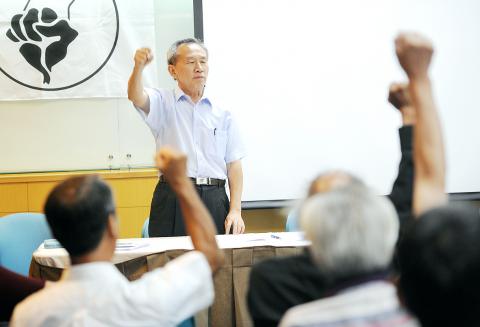The Taiwanese National Party (TNP) yesterday announced its formation in Taipei, becoming the only political party in the nation to list a referendum on self-determination and the creation of a new country as its objectives.
Huang Hua (黃華), who served four jail terms for a total of 23 years for his involvement in Taiwan’s independence movement during the Martial Law era, was voted chairman of the party. Huang served as an adviser to former president Chen Shui-bian (陳水扁).
“No one will give you an independent country as a gift. You have to earn it and that’s why we are establishing this party today,” Huang said.

Photo: Lo Pei-der, Taipei Times
About 100 independence supporters, most of them seniors, have registered as the party’s founding members. Among them, more than a dozen are retired or active university professors who used to be actively associated with the Taiwan Independence Party, otherwise known as the Taiwan Nation Party, which has lost momentum in recent years.
The party chose its founding day to remember the Taiwanese People’s Party, the first political party established by Taiwanese on July 10, 1927, during the Japanese colonial era.
The new party aims to promote Taiwanese nationalism by what it called the “Taiwan nationalism movement 2.0,” with the ultimate goal of “expelling the Chinese and safeguarding Taiwan” and the mid-term goal of holding a national referendum under international observance on Feb. 28, 2014, to determine Taiwan’s independence.
“Chinese” were defined by the party as “people who were born in or have lived in Taiwan for an extended period, but who identify [themselves] as Chinese,” Ted Lau (劉重義), mastermind of the party’s political philosophy, said in a keynote speech.
The first phase of the Taiwan nationalism movement ended last year in failure, Liu said, adding that a brand new “2.0” era would consist of actions as well as promotion and mobilization through the Internet and social media.
The TNP intends to duplicate the experience of Estonia, a former Soviet Republic that declared independence in 1991, by enlisting Taiwanese who favor the establishment of a new country, before holding a national referendum.
Liu said the party also tried to pattern itself after the Sinn Fein, a political party in Northern Ireland that supports the establishment of a new Irish Republic, and functions as part of a trinity organization, with the Taiwanese National Congress and the Taiwan Guardian Team making up the other two organizations.
“However, I think Taiwan has a mature society and mechanism, so the Taiwan Guardian Team will not be a military organization like the Irish Republican Army. It will be a grassroots organization that works for local communities instead,” Liu said.
“The road to Taiwan independence has been and will be a long and winding road,” political commentator Paul Lin (林保華), a Chinese who obtained Republic of China citizenship, said before giving the TNP his blessing.
The TNP said it would endorse Democratic Progressive Party Chairperson and presidential candidate Tsai Ing-wen (蔡英文) in the presidential election in January, adding that it planned to nominate candidates for the legislative election.

Three Taiwanese airlines have prohibited passengers from packing Bluetooth earbuds and their charger cases in checked luggage. EVA Air and Uni Air said that Bluetooth earbuds and charger cases are categorized as portable electronic devices, which should be switched off if they are placed in checked luggage based on international aviation safety regulations. They must not be in standby or sleep mode. However, as charging would continue when earbuds are placed in the charger cases, which would contravene international aviation regulations, their cases must be carried as hand luggage, they said. Tigerair Taiwan said that earbud charger cases are equipped

Foreign travelers entering Taiwan on a short layover via Taiwan Taoyuan International Airport are receiving NT$600 gift vouchers from yesterday, the Tourism Administration said, adding that it hopes the incentive would boost tourism consumption at the airport. The program, which allows travelers holding non-Taiwan passports who enter the country during a layover of up to 24 hours to claim a voucher, aims to promote attractions at the airport, the agency said in a statement on Friday. To participate, travelers must sign up on the campaign Web site, the agency said. They can then present their passport and boarding pass for their connecting international

WEATHER Typhoon forming: CWA A tropical depression is expected to form into a typhoon as early as today, the Central Weather Administration (CWA) said yesterday, adding that the storm’s path remains uncertain. Before the weekend, it would move toward the Philippines, the agency said. Some time around Monday next week, it might reach a turning point, either veering north toward waters east of Taiwan or continuing westward across the Philippines, the CWA said. Meanwhile, the eye of Typhoon Kalmaegi was 1,310km south-southeast of Oluanpi (鵝鑾鼻), Taiwan’s southernmost point, as of 2am yesterday, it said. The storm is forecast to move through central

The age requirement for commercial pilots and airline transport pilots is to be lowered by two years, to 18 and 21 years respectively, to expand the pool of pilots in accordance with international standards, the Ministry of Transportation and Communications announced today. The changes are part of amendments to articles 93, 119 and 121 of the Regulations Governing Licenses and Ratings for Airmen (航空人員檢定給證管理規則). The amendments take into account age requirements for aviation personnel certification in the Convention on International Civil Aviation and EU’s aviation safety regulations, as well as the practical needs of managing aviation personnel licensing, the ministry said. The ministry